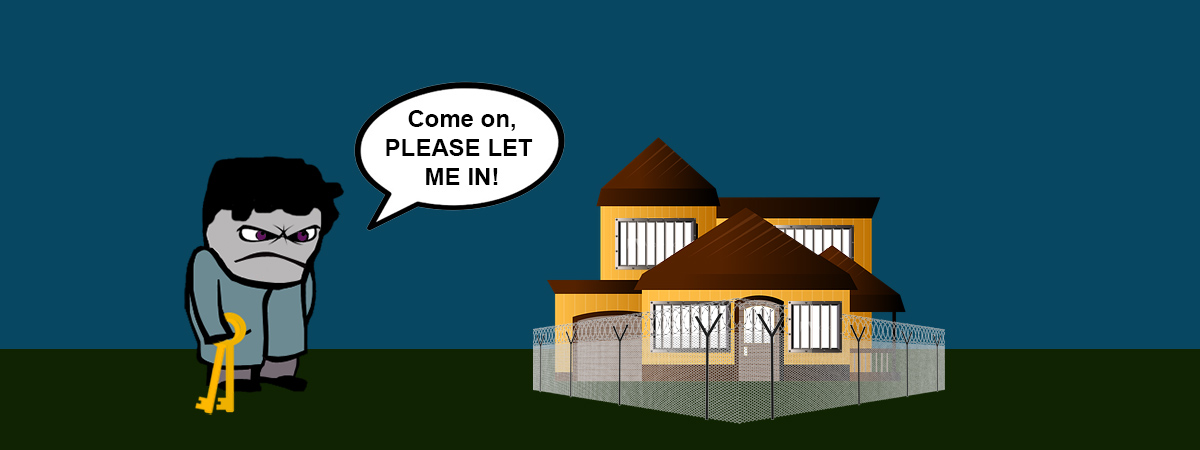
This can be a tragic dilemma. A genuine hair-ripping-out moment.
If you’re reading this article because you’re currently caught in this predicament, then you’re probably feeling worried and angry. It’s normal. You are NOT alone.
When tenants don’t allow their landlord to enter the property it’s usually because one of the following reasons…
- Rogue tenants – your tenants have turned rogue, whether that be because they’ve fallen in rent arrears and are now avoiding you, or you’ve done something to annoy them, or maybe they’ve converted your property into a Cannabis farm (it happens). In any case, they’re intentionally making life difficult for you by ignoring you.
- Rogue landlord – you’ve been a naughty landlord, whether that be because you’ve failed to keep on top of maintenance issues or because you’re genuinely harassing them, and now your tenants have decided to make a stand!
Which one is it? To be honest, it doesn’t really matter, because the law doesn’t care. But let’s take a look at what the law says in this volatile situation, because that’s all that really matters in these situations.
Before I start, I want to warn you about something.
I want to warn you that the reality of the situation is usually depressing, particularly for landlords that are about to learn what the deal is for the first time. I assume almost everyone reading this particular post will looking for a way of entering their property legally. Unfortunately, there is no easy way to do that if you’re not given access by the tenant. But let explain why, because it’s important to understand how horrendous and soul-destroying landlord law in England & Wales is…
Page contents
- The Landlord’s right of access
- Access for repairs & maintenance
- Emergency access
- Still not given permission to enter
- If threatening with legal action doesn’t work
- Legal advice
The Landlord’s right of access
Essentially, we’re talking about right of access here, right? Right!
You’re a landlord and for whatever reason you want to enter your property, whether that be for a routine property inspection or something more crucial like a gas safety check. Whatever. It doesn’t matter. You just want in!
As the law stands, the tenant is entitled to what is known as “quiet enjoyment“, which essentially means the they have legal rights to live in the property as his or her home. That means the Landlord must be granted access by the tenant before entering the premises.
Simply, you cannot force entry.
Under the Protection from Eviction Act 1977, any form of intimidation or making the tenant feel they may be assaulted, is deemed as harassment. This can also include turning up at the property unannounced. More details available in the Landlord’s Right Of Entry blog post.
Access for repairs & maintenance
This is where it gets a little bit confusing. And tedious. And weird. And ridiculous.
While the law states that tenants are entitled to live in “quiet enjoyment”, the ‘landlord and tenant act 1985 section 11’ stipulates that the landlord’s legal obligation is to repair and maintain the property and that the tenant must allow the landlord access to do essential repairs. That includes doing an annual gas safety check.
However, despite the fact the tenant should allow access, landlords still can’t force entry when they’re not given access to enter (I believe it would be trespassing). Entering the property against your tenants will could give them grounds to start a claim against you for harassment, under the Protection from ‘Eviction Act 1977’.
Like I said, soul-destroying. And tedious. And weird. And ridiculous.
In this situation, it is advised to try and make all “reasonable” efforts to communicate with the tenant and explain that you need access the property to do vital maintenance work. If they refuse entry or completely ignore your efforts, you should try the following…
- Write to them – send three powerful written letters (staggered by a week or so) requesting permission to enter, and explain why it so crucial.
Keep a copy of ALL your efforts and send all letters via recorded delivery or email. This way if a claim is bought against you under the basis of neglecting your responsibilities to repair and maintain the property, you can prove that you tried, and through no fault of your own were your obligations not met.
- Contact your council – if it’s a safety related issue or relatively important maintenance work that needs attending to, get someone “official”, for example someone from the Council, to talk to your tenants and explain that it really is necessary, it’s not just the landlord being nosey
Emergency access
From what I understand, there is one exception to the rule. Only under a situation that can be deemed as an “emergency” may the Landlord enter without permission. This will include situations like flooding/leak or fire.
Still not given permission to enter
You’ve tried to communicate with them, you’ve given them time to respond, and still nothing. Not a God damn thing.
You’re probably contemplating some nasty shit at this point, which involves a sledgehammer and a few burly men with tasteless tattoos.
Fight the temptation! Trust me.
The most important thing to do in this situation is continue to follow the legal protocol. It’s easy to derail by taking matters into your own warped and twisted hands. But you need to remember, that’s a sure-fire way of making a bad situation into a terrible situation, so keep your cool.
If your tenant will not allow you entry into the property after multiple attempts, you should threaten to take them to court for “access”. Most tenants eventually cave in at this point, especially if you have followed protocol. If at any point you have given them leverage (i.e. you have turned up at the property announced or called them every multiple times a day), they will have a good reason to fight and continue refusing access. That’s why it is crucial to stay on track and resist temptation.
If threatening with legal action doesn’t work
You threatened them with legal action and they still aren’t playing ball. Fucking bastards!!
It’s appropriate for me to swear at this stage, right? Right.
Granted, it’s the worst possible scenario, but it is the final step. You have a few options here…
- Apply for an injunction – you can apply to the courts for an injunction to gain access to your property. Assuming that you followed protocol and can prove you made “reasonable” efforts to gain access, you should be successful. However, serving a section 21 is probably the favoured option…
- Section 21 – you can serve a Section 21 and repossess your property. The odds are, if your tenant is refusing you access then you don’t want them as tenants anymore- the relationship has obviously turned sour and there’s an apparent communication problem.
Assuming you have followed your landlord obligations by protecting your tenants deposit and serving the prescribed information correctly, you can serve a Section 21 notice. Here’s a more detailed blog post on how to end a tenancy agreement.
Legal advice
If you find yourself in this situation and you’re at your wit’s end and unsure of what to do (which I’m sure many of you will be), my advise is to contact your local Citizens Advice for free legal advice!
If you’re in this situation or have been in this situation, please feel free to share your story :)
Disclaimer: I'm just a landlord blogger; I'm 100% not qualified to give legal or financial advice. I'm a doofus. Any information I share is my unqualified opinion, and should never be construed as professional legal or financial advice. You should definitely get advice from a qualified professional for any legal or financial matters. For more information, please read my full disclaimer.


 Landlord Products / Services
Landlord Products / Services






























@Romain
Automatically went to moderation because there were a couple of outgoing links.
I get what you're saying, but I don't agree with you :)
A few points before I depart from this disagreement...
The Fox Williams article doesn't specifically say what the deal is if the tenant specifically denies entry. The examples I provided specifically say that the landlord cannot enter if the tenant doesn't give permission.
Secondly, "Quiet Enjoyment" is a "Statutory right", so regardless of what is written in the tenancy agreement regarding unauthorised entry, it wouldn't be legally enforceable. Statutory rights can't be overridden, even if agreed and signed.
You're implying that because it's in the tenancy agreement it's enforceable. It's not. In fact, I've seen so many clauses in so many tenancy agreements that aren't legally enforceable because it impedes statutory rights. A classic is landlords requiring 2+ months notice from the tenant (even during a month-by-month periodic tenancy)- that's not enforceable, even if it's signed.
In any case, my point still stands, your sentiments in your initial comment (comment #2) is not true at all.
As said, agree to disagree. Feel free to enter without permission if you feel a clause in a tenancy agreement permits it!